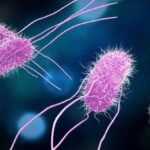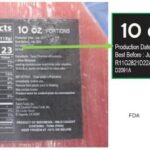FDA adds Salmonella outbreak to its CORE Outbreak Investigation Table, while the USDA adds an E. coli O157:H7 outbreak to theirs, which may be associated with beef. Very little information has been provided for these new outbreaks. For the new outbreak of Salmonella Typhimurium on the FDA site, the food has not yet been identified. There are currently 264 cases, which is a very high case count for an unidentified outbreak. The FDA is working with partners to investigate "multiple food items of interest" to try to determine the cause of this outbreak. Traceback has been initiated. The new E. coli O157:H7 outbreak on the USDA table is suspected to be linked to beef. There is no information about patient case counts, patient ages, states where ill persons live, or what type of beef … [Read more...]
Frozen Pacific Fusion Tuna Steaks Recalled For Histamines
Frozen Pacific Fusion tuna steaks are being recalled for elevated histamine levels, which can cause an allergic reaction called scombroid fish poisoning. Symptoms of this reaction can include tingling and burning in the mouth, facial swelling, hives, itchy skin, nausea, vomiting, and diarrhea. These symptoms typically appear within minutes to several hours after eating contaminated fish. One consumer complaint triggered this recall. If these symptoms are severe, medical treatment should be sought. The recalling firm is Relish Foods of El Segundo, California. The recalled item is Frozen Pacific Fusion Tuna Steaks that are packaged in 10 ounce containers. They were sold in Northern California and were made for sale at Save Mart Supermarkets and Lucky Stores from October 6, 2021 … [Read more...]
The Northeast Seafood Salmonella Outbreak is Number Two of 2021
The Northeast Seafood Salmonella outbreak is the number two multistate food poisoning outbreak of 2021, with 115 people sick in 15 states. Twenty people were hospitalized. Most of the patients live in Colorado, where Northeast Seafood operates. The outbreak ended on December 6, 2021. The patient case count by state was: Arizona (1), California (1), Colorado (93), Connecticut (1), Iowa (1), Minnesota (2), Missouri (1), Nebraska (2), New Jersey (2), Pennsylvania (1), Texas (2), Virginia (3), Washington (1), Wisconsin (2), and Wyoming (2). Illness onset dates ranged from May 11, 2021 to October 16, 2021. The patient age range was from less than one year to 85 years. Interviews with patients revealed that 83% ate seafood, including raw seafood served as sushi, before they got sick. … [Read more...]
Seafood Salmonella Outbreak History Goes Back Years
A new Salmonella Thompson outbreak has been linked to fish produced by Northeast Seafood Products. The outbreak has sickened at least 102 people in 14 states. Is seafood commonly contaminated with this pathogen? Let's look at seafood Salmonella outbreaks in the past few years. Salmonella does not occur naturally in fish or shellfish, as it does in poultry. For this food to be contaminated with the pathogen, it must come from an outside source, either in water or production and processing facilities. We don't know what happened in the current outbreak yet. In 2012, a Salmonella Bareilly outbreak associated with tuna imported from India sickened at least 425 people. Fifty-five people were hospitalized. In 2015, a Salmonella Paratyphi outbreak sickened six people in New Mexico. … [Read more...]
Salmonella Thompson Outbreak Linked to Northeast Seafood Fish
A Salmonella Thompson outbreak linked to Northeast Seafood fresh fish has sickened at least 102 people, mostly in Colorado, according to the Centers for Disease Control and Prevention (CDC). Nineteen people are hospitalized. No deaths are reported. The case count by state is: Arizona (1), Colorado (82), Connecticut (1), Iowa (1), Minnesota (2), Missouri (1), Nebraska (2), New Jersey (2), Pennsylvania (1), Texas (2), Virginia (2), Washington (1), Wisconsin (2), and Wyoming (2). Illness onset dates range from May 11, 2021 to September 7, 2021. The fish was sold in Colorado from May 2021 to October 7, 2021, according to the FDA recall notice. The patient age range is from less than one year to 85 years. Of 89 people who gave information to investigators, 19 have been hospitalized, … [Read more...]
Northeast Seafood Fish Recalled For Salmonella Contamination
Northeast Seafood fish are being recalled for possible Salmonella contamination, as the FDA and CDC say the products are linked to a Salmonella Thompson outbreak. At least 102 people are sick, and 19 people have been hospitalized. The recalling company is Northeast Seafood Products of Denver, Colorado. The voluntary recall is being issued for fresh raw seafood that was processed at the company's facility. The recalled fish items are: Haddock Monkfish Bone-in Trout Grouper Red Snapper Red Rock Cod Ocean Perch Pacific Cod Halibut Coho Salmon Atlantic Salmon Portions Lane Snapper Tilapia All Natural Salmon Fillet Pacific Sold Farm Raised Striped Bass The fish was sold from May 2021 to October 7, 2021 to restaurants in Colorado and also … [Read more...]
Food Allergens Can Become Airborne: How to Handle the Risk
Food Poisoning Bulletin constantly reports on food recalls for the eight major food allergens: peanuts, tree nuts, milk, fin fish, shellfish, wheat, eggs, and soy. Those eight allergens together cause at least 30,000 emergency room visits, 2000 hospitalizations, and 150 deaths in the U.S. every year. Recently we became aware that some foodborne allergens can become airborne. Some of the allergens are more of a risk than others. For instance, peanut allergens usually do not become airborne, and allergic reactions are not triggered from peanut butter vapors, according to a study published in the American Academy of Allergy, Asthma, and Immunology. Since peanuts allergies are typically more severe and more likely to trigger anaphylactic shock, this is a relief. Some other food … [Read more...]
FDA Revises 2017 Fish Advice For Pregnant Women, Young Children
The FDA is revising its 2017 fish advice for pregnant and breastfeeding mothers and young children, given the worries about mercury in fish. Dr. Susan Mayne, director of the FDA's Center of Food Safety and Applied Nutrition, said in a statement, "Fish and shellfish are an important part of a well-rounded diet. However, we know many consumers worry about mercury in fish and even choose to limit or avoid fish because of this concern. In fact, we have seen that women in the U.S. who are pregnant are consuming far less than the recommended amount of seafood." In 2017, the FDA released a reference chart to help consumers choose the types of fish to eat more or and less of because of their levels of mercury. The fish species are listed under Best Choices, Good Choices, and Choices to … [Read more...]
FDA and EPA Release Fish Consumption Advice
The FDA and EPA have issued advice about eating fish, geared toward pregnant women, women of child-bearing age, breastfeeding mothers, and parents of young children. The issue regarding fish consumption is mercury content. A reference chart sorts 62 types of fish into three categories: "Best choices" you can eat two to three times a week; "good choices" that you can eat once a week, and "fish to avoid." Fish in the "best choices" category include almost 90% of the fish eaten in this country. FDA conducted an analysis of fish consumption data and found that 50% of pregnant women surveyed ate less than 2 ounces a week. That is much less than the recommended amount. The nutritional benefits of eating fish are important for growth and development during pregnancy and early … [Read more...]
Oceana and Sky Truth Launch Global Fishing Watch
Oceana, Sky Truth and Google are announcing the launch of Global Fishing Watch, a technology platform that creates the first global view of commercial fishing. It will give consumers an online platform to share and track information about fishing activity around the world. The system is designed to make what happens on the world's oceans visible and transparent. Too many fishermen harvest using bottom trawling and bycatch, which catches and destroys many vulnerable and important species of fish and marine life. Sustaining the health of the ocean is a critical priority for the future of the world and its citizens. Andrew Sharpless, CEO of Oceana, said in a statement, "Global Fishing Watch is designed to empower all stakeholders, including governments, fishery managers, citizens and … [Read more...]












